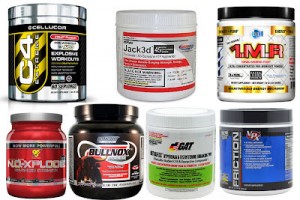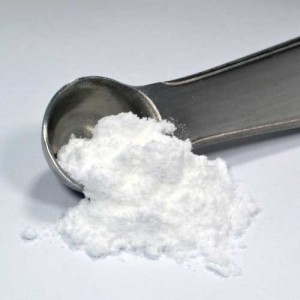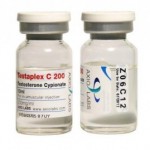By Anthoney J. Andersen – Steroidal.com
With daylight savings time now upon us, you might be feeling more sluggish than usual, and your body is probably struggling to find the extra energy to partake in recreational activities outside of work, including exercising.
When your body feels worn down, it makes it difficult for your muscles to exert enough energy to push your body toward the intense workout that it desires.
So what is the solution? How do you provide your body with more energy so it can hurdle over that towering wall of exhaustion?
The answer is simple: add a pre-workout supplement to your daily diet.
 PRE-WORKOUT SUPPLEMENTS: THEIR PURPOSE
PRE-WORKOUT SUPPLEMENTS: THEIR PURPOSE
In order for your body to get a proper workout, both your muscles and your heart rate should reach a pivotal point of exertion that allows your body to capitalize on the amount of calories it burns and forces your muscle fibers to stretch and tear (this is a good thing), which will build stronger and larger muscles in the end.
Pre-workout supplements not only deliver more energy to your muscles, but they also contain ingredients that help your body recover from those intense training sessions.
The following is a list of some key ingredients (and their function) to keep an eye out for when considering your pre-workout supplement:
ARGININE
Arginine is a pre-cursor to nitric oxide, which has potent vasodilation in endothelial cells. Endothelial cells are the cells that form a barrier between your blood and the rest of the blood vessel walls, called the endothelium.
When you consume food or beverages with a high amount of arginine, it will react with the oxygen in your body to create nitric oxide. The nitric oxide will then make the endothelium expand, therefore allowing more blood to be delivered through your veins. As a result, your body can now deliver more oxygen and nutrients to your muscles. This also helps give your muscles that “extra pump” during training.
Arginine can also help increase the storage of creatine, increase fat loss and increase weight loss during resistance training programs. Arginine can be extremely beneficial for those individuals involved in sprint or power sports.
There is no recommended daily amount established for arginine because the human body normally produces enough. However, if taken as a supplement, higher doses of arginine are often needed, and up to 1,200 mg per day have been shown to be helpful, according to WebMD.
BETA ALANINE
According to Livestrong.com, beta alanine is a non-essential amino acid that occurs naturally in the body and is also found in such foods as chicken, pork, beef and fish. Amino acids are the building blocks of protein – the primary fuel for muscle growth.
Research has proved that beta alanine has beneficial effects on muscular anaerobic endurance. A study in the December 2009 issue of “Medicine and Science in Sports and Exercise” reports that beta alanine increases muscle carnosine content, therefore allowing the potential to improve physical performance during high-intensity exercise.
Carnosine is a small molecule composed of the amino acids histidine and alanine. Carnosine acts like a buffering agent that helps maintain an optimal muscle pH range, which delays the onset of muscle fatigue.
A study in the December 2008 issue of the “International Journal of Sports Medicine” showed that four weeks of beta alanine supplementation could significantly improve muscular endurance during resistance training.
Researchers recommend taking between 3.2 and 6.4 grams of beta alanine per day, which will help significantly boost carnosine levels to improve performance and increase lean muscle.
By now you are probably learning that your muscles require energy in order to function properly. Creatine happens to be a key nutrient involved in the production of energy.
Creatine is a nitrogenous organic acid produced in the liver that helps supply energy to cells all throughout the body – particularly muscle cells. It is made from three amino acids: L-arginine, glycine and L-methionine.
Creatine is transported through the blood by an active transport system; the brain and muscles that have high-energy demands, such as skeletal muscle, then use it. According to Medicalnewstoday.com, around 95 percent of creatine in the human body is stored in skeletal muscle.
Because of creatine’s ability to supply energy where it is demanded, the chemical is mainly used by athletes to increase their ability to produce rapid energy – which in turn, helps improve athletic performance and allows them to train harder.
“If you can lift one or two more reps or five more pounds, your muscles will get bigger and stronger,” said Chad Kerksick, Ph.D., assistant professor of exercise physiology at the University of Oklahoma.
According to Menshealth.com, creatine is most effective in high-intensity training and explosive activities. This includes weight training and sports that require short bursts of effort, such as football, sprinting and baseball.
Effective doses of creatine vary depending on your diet and fitness goals. However, current studies tend to follow a very standard protocol:
- 20 g per day for 5-7 days (known as the “loading phase”)
- 5 g per day for the remainder of the cycle (“maintenance phase”)
L-TAURINE
L-taurine, or referred simply as taurine, is a non-essential amino acid. It is considered non-essential because adults can produce taurine, and it is also found in meat, fish and dairy products. According to Dr. Elson M. Haas in his 1992 book “Staying Healthy with Nutrition,” if not enough taurine is produced in the body, then supplementation may be required.
Taurine helps to move key nutrients – such as potassium, magnesium and calcium – in and out of your heart’s cells to improve its functioning. Low levels of taurine have been found in individuals who have suffered from a heart attack.
According to Livestrong.com, previous research has shown taurine’s ability to increase left ventricular contractility, which lowers heart rates at sub-maximal intensities, thus improving performance in endurance activities, such as distance running and cross country skiing. Taurine supplementation has also shown to reduce exercise-induced muscle fatigue due to its antioxidative properties.
FOOD FOR THOUGHT
So if you are discovering that you’re in a physical rut when it comes to your training, then you might consider visiting your local vitamin/nutrition store and find a pre-workout supplement that can push your training and your muscles out of the lethargic state that they are currently in and slam them into overdrive by boosting your body’s energy and nitric oxide levels.
When researching pre-workout supplements, make sure to look at the key ingredients involved and consider choosing a supplement that contains some of the aforementioned nutrients.
Furthermore, if you have a pre-existing medical condition, it’s best to speak with your doctor first and make sure that the supplement will not have a negative impact on your overall health.
Stay active.








